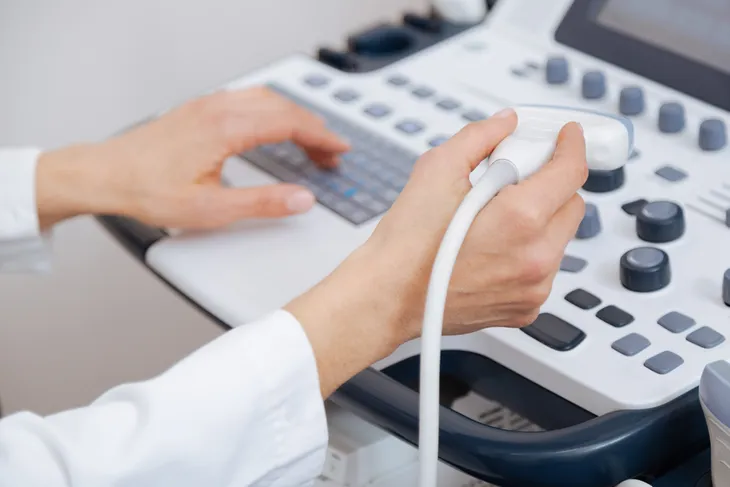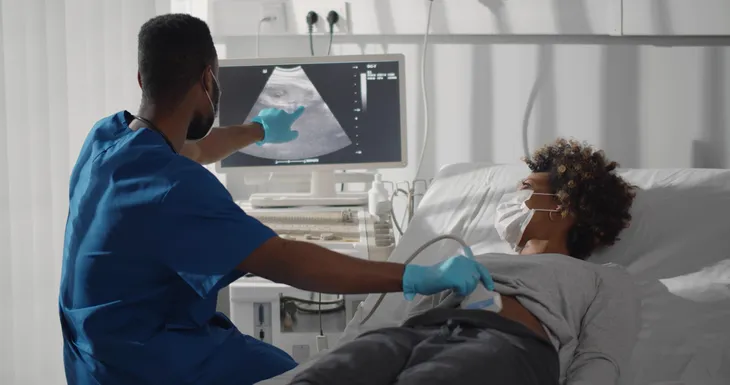- Ultrasounds are a type of medical test that uses high-frequency sound waves to capture images of the inside of your body.
- It’s a great tool that helps your doctor examine internal organs and diagnose health problems in a non-invasive way.
- The steps you need to take to prepare will vary depending on the area or organ that is being examined.
Medical exams can be unnerving and ultrasounds are no exception. While you may be anxious about your upcoming ultrasound, find comfort in knowing that it can provide your doctor with valuable information for diagnosing and treating an array of ailments. They’re also fairly non-invasive. By getting informed on what to expect before, during, and after, you can help calm your nerves.
What Is an Ultrasound?
An ultrasound (also called sonography or diagnostic medical sonography) is a type of medical test that uses high-frequency sound waves to capture images of the inside of your body. Ultrasounds help your doctor identify problems in your organs, vessels, and tissues, without having to perform surgery.
Healthline points out that another bonus of ultrasounds is that it doesn’t use radiation, unlike some other imaging techniques. This makes it the preferred method for viewing a fetus during pregnancy, says the source.
What Is the Purpose of an Ultrasound?
Most people may think of pregnancy when thinking about the purpose of an ultrasound, however, that’s just one of its uses. While it is an effective imaging test for viewing a growing fetus, it’s also a helpful tool for looking at other internal organs. Some of these may include your bladder, kidneys, liver, gallbladder, thyroid, spleen, pancreas, blood vessels, and more.
Healthline also explains that an ultrasound, “is also a helpful way to guide surgeons’ movements during certain medical procedures, such as biopsies.”
Preparing for an Ultrasound
If your doctor has ordered an ultrasound, it’s important to follow their exact instructions on how to prepare. The steps you need to take will vary depending on the area or organ that is being examined. For example, some ultrasounds require that you fast for up to 8- to 12-hours before the procedure. Your doctor may tell you not to empty your bladder before the exam.
Ahead of your exam, be sure to inform your doctor of any prescription medication, over-the-counter medication, or supplements you are taking to ensure they won’t interfere with the ultrasound. Finally, you can rest easy knowing that ultrasounds have minimal risks because they don’t use radiation.
Since preparation can vary, let’s take a look at what it might entail for different ultrasounds.
Preparing for a Pregnancy Ultrasound
Ultrasounds are commonly used for pregnant women. The sound waves produce pictures of the baby in the womb and also help your doctor keep an eye on your child’s health and development.
To prepare for your upcoming ultrasound, your doctor will likely advise that you drink 32-ounces of fluid. You mustn’t empty your bladder before your appointment as it must be full for the exam. This is because a full bladder helps push the bowel out of the pelvis for better visualization.
Preparing for a Pelvic Ultrasound
Pelvic ultrasounds are often used to examine the female pelvic organs. Some of the purposes include examining the size and shape of the ovaries. It may also examine the length and thickness of the cervix and changes in bladder shape, or it may be used to examine pelvic masses.
A pelvic ultrasound can be performed using two different methods, explains Johns Hopkins Medicine. One method is done on the abdomen, known as transabdominal, while the other, known as transvaginal, is done by inserting a long, thin transducer into the vagina. The type you need will depend on the reason for the ultrasound.
Preparing for this ultrasound is fairly simple. Like pregnant women, you’ll also likely be advised to arrive at your appointment with a full bladder.
Preparing for a Retroperitoneal Ultrasound
A retroperitoneal ultrasound is used to examine the area behind your intestines. Doctors often use it to look at your kidneys and ureters. It’s also used to diagnose several conditions, such as gallstones or renal cysts.
Preparing for this ultrasound is also simple. You can likely eat your normal meals and take all medications as usual. However, like some other ultrasounds, you’ll be asked to drink several glasses of water to provide a better view of your organs.
Preparing for an Abdominal Ultrasound
If you’re experiencing stomach pain or chronic bloating, your doctor may recommend an abdominal ultrasound. These can be used to check for tumors, liver disease, and more.
Artius Health says you may be advised to eat a low-fat dinner the evening before your exam. This means no fried, fatty, or greasy foods, as well as no dairy products. You may also be asked to fast (no eating or drinking) for 12-hours before your appointment.
Preparing for an Ultrasound-Guided Needle Biopsy
An ultrasound-guided biopsy is often used to examine a lesion or mass. It’s typically used for breasts, lymph nodes, or liver biopsies. In some cases, this test is also used with an endoscopy or bronchoscopy if the mass is located in the GI tract or lungs. These are known as endoscopic ultrasound (EUS) or endobronchial ultrasound (EBUS).
There usually isn’t much preparation for an ultrasound-guided needle biopsy; however, if you also require a EUS or EBUS your doctor may have further instructions. It’s also worth noting, that if you’re taking blood thinners you may have to stop a few days before the test. Be sure to follow the instructions from your doctor.
Preparing for an Ultrasound-Guided Cyst Aspiration
An ultrasound-guided cyst aspiration is a “minimally invasive procedure that uses sound waves (ultrasound) to pinpoint a cyst,” explains Jefferson Radiology. The ultrasound can help determine whether the lump is a solid lump or a fluid-filled cyst. The ultrasound can also help guide a thin needle into the cyst to remove the fluid.
The source says, when preparing for your appointment it’s important to let the health professionals know if you have any allergies to latex, lidocaine or if you’re currently taking any blood-thinning medications. Your doctor may recommend that you stop taking blood thinners before your appointment.
 novak.elcic / Shutterstock
novak.elcic / ShutterstockWhat to Expect Before the Procedure
Ahead of your ultrasound appointment, the Mayo Clinic suggests wearing comfortable, loose clothing. Before the ultrasound begins you may be asked to remove any jewelry, especially from the area that is being examined. You may also be asked to remove your clothing and then change into a gown. Then, you’ll be asked to lie on the examination table.
The source also recommends leaving any valuables at home. While your doctor’s office or hospital is usually a safe space, it’s just a good idea to ensure you don’t forget or lose anything valuable at your appointment.
What to Expect During the Procedure
During the procedure, you will likely lay on an examination table. The Mayo Clinic says gel is applied to your skin over the area that will be examined. The gel “helps prevent air pockets, which can block the sound waves that create the images,” explains the source.
To perform an ultrasound, a trained technician, known as a sonographer, will press a small hand-held transducer against the area that is being examined. They’ll move it around to capture the image. “The transducer sends sound waves into your body, collects the ones that bounce back, and sends them to a computer, which creates the images,” explains the source.
What to Expect During Other Ultrasounds
In some cases, an ultrasound may need to be done inside your body. Some examples include a transesophageal echocardiogram, transrectal ultrasound, and transvaginal ultrasound. Knowing what to expect during this type of exam is important too and can help ease your mind ahead of the procedure.
The Mayo Clinic says when you need an ultrasound inside your body, the transducer is attached to a probe, and then it’s inserted into your body. The good news is that ultrasounds are usually painless but “you may experience mild discomfort as the sonographer guides the transducer over your body, especially if you’re required to have a full bladder, or inserts it into your body,” explains the source.
What to Expect After the Procedure
An ultrasound can take anywhere from 30-minutes up to an hour, depending on the area that is being examined. Once the procedure is complete the technician will wipe off any remaining gel on your skin.
Following the test, the technologist will send the images to a radiologist to be reviewed. After examining the photos, the radiologist will send a written report to your doctor, and then your doctor will share the results with you. The Cleveland Clinic says results are usually available within days of your exam.















